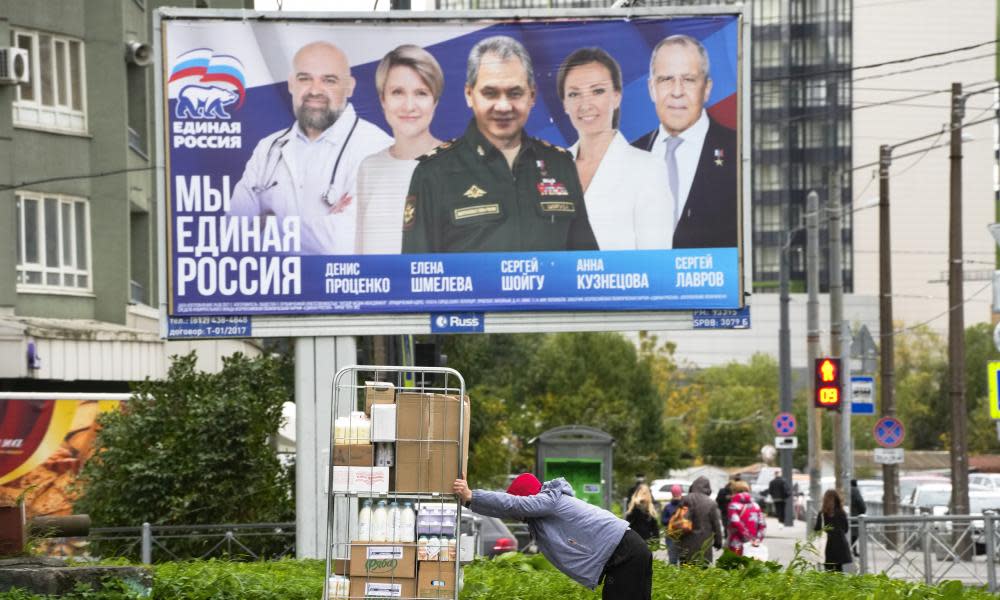Russians head to the polls amid anger over economy and Covid

Russians will head to the polls beginning Friday for parliamentary elections that could serve as a platform for popular anger over the economy, a crackdown on dissent and the government response to the coronavirus pandemic. But the ruling party United Russia is likely to find a way to maintain a stranglehold on its control of the State Duma.
While stifling political opposition and independent media, the Kremlin is trying to solve a simple maths problem: how can it prop up the numbers of United Russia, which is polling at near-historic lows, without provoking the kind of protests that broke out over widespread incidents of crude voter fraud in 2011.
Before the vote, which will be held over three days, there has been increasing support for the Communist party, while other opposition behind Alexei Navalny, the jailed Kremlin critic, has sought to consolidate through a “smart voting” effort that mainly identified Communist candidates as the strongest challengers.
“There are a lot of people who are unhappy,” said Anastasia Bryukhanova, an independent candidate from one of the country’s most opposition-minded districts in north-west Moscow. “The biggest problem remains a lack of belief in our own power, a lack of belief in the elections themselves. The biggest battle is to get people out to the polling station and at least try to resist.”
Russia’s Communist party has seen its polling rise above 19% in recent weeks, in large part because of stagnant wages and rising prices. It has also sought to broaden its appeal, bringing in younger candidates from the party’s youth wing or running outsiders in first past the post (FPTP) votes in local districts.
But the party has often aligned itself with United Russia and is still led by the same leader, Gennady Zyuganov, who ran against Boris Yeltsin in 1996. While it did oppose Vladimir Putin’s proposal to renew his presidential terms during last year’s constitutional referendum, it has often been derided as a “pocket opposition”.
“Many people say that, in their view, the leadership of the Communist party often compromises … they don’t trust them,” said Mikhail Lobanov, a candidate for the party in a district in western Moscow, in a television interview this week. “I think that the Communist party and its leadership should change: it should become more radical, more decisive. Not give in to pressure. And then it can return the support of people who have turned away from it.”
United Russia, meanwhile, has seen its support bottom out, with fewer than 30% of Russians telling state pollsters that they would vote for the ruling party. To maintain its current constitutional majority (it has 336 of 450 MPs in the current Duma), the party will rely on winning FPTP districts, an elections format that has been expanded in recent years to 225 of the Duma’s 450 open seats.
In Moscow, United Russia has put up candidates from popular grassroots initiatives, like the search-and-rescue nonprofit Liza Alert, to attract votes. Putin also signed off on cash handouts to families and members of the military ahead of the vote, and local governments are offering prizes such as new apartments, cars and gift certificates to those who sign up to vote online.
Top opponents of the government have been jailed, disqualified or run out of the country, including Dmitry Gudkov, a former member of the Duma. It has also sought to divide the opposition vote, in some cases running doppelgangers who can siphon off precious ballots in tight races. Two opponents of Boris Vishnevsky, a veteran St Petersburg lawmaker critical of the Kremlin, even changed their names and appearances to fool voters on the ballot. “I have never seen anything like it,” he said in an interview.
Past votes, particularly in 2011, have been marred by ballot-stuffing and other crude efforts to deliver not just a United Russia victory, but a landslide for the ruling party. The biggest change to this year’s vote is that it will take place over three days and also online, maximising turnout and making it extremely difficult to confirm that the number of ballots matches the number of voters. Golos, an elections NGO that has been named a foreign agent by the Russian government, has said just 50% of the country’s precincts will have independent monitors.
When all else fails, United Russia will hope for opposition infighting to divide the protest vote and deliver victory to a friendly candidate.
Bryukhanova, a rare independent on the ballot in Russia, was recently backed by Navalny’s smart voting scheme, snubbing another liberal candidate from the established, if somewhat ineffective, Yabloko party.
“I consider the decision in our district a big mistake,” wrote Marina Litvinovich, her opponent. “But it would be wrong to decide for [voters]. If you wanted to support ‘smart voting’, then vote for the candidate it suggests. If you want to support me, then vote as your heart tells you.”
Those who do make it through will find themselves outmatched in the Duma. But Bryukhanova said it was worth it. “First of all, it is about symbolism. To show that it is possible. To show that a politician like me with my views … can win in these elections, even with all their violations.”

 Yahoo News
Yahoo News 
